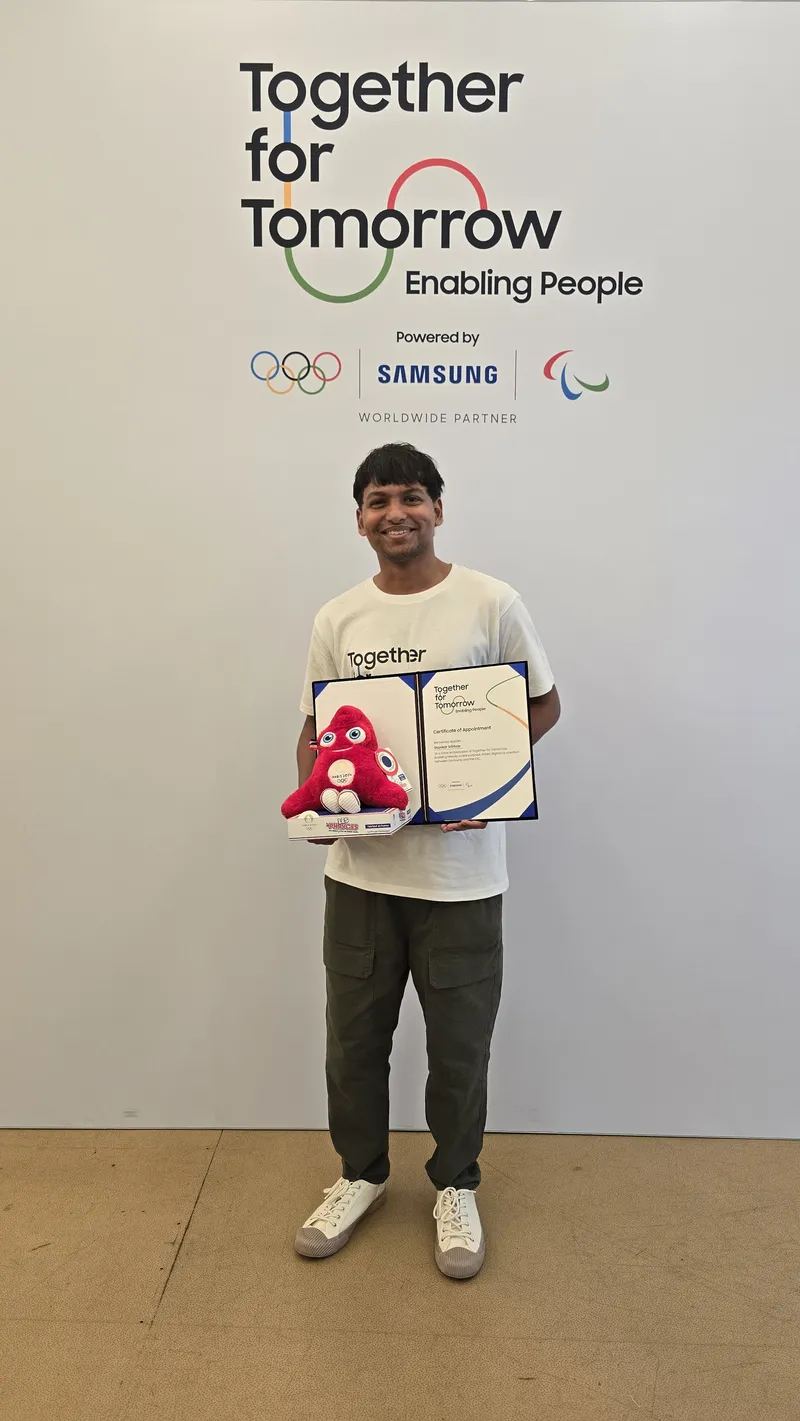This 24-year-old Bengaluru student has developed a wearable device that aims to reduce stress
Sputnik Brain, a non-invasive wearable device developed by Shankar Srinivasan, aims to reduce stress. It addresses the global need for chemical-free stress relief solutions and aims to impact mental healthcare in the future.
At Together for Tomorrow-Enabling People, an innovation event powered by Samsung, held on the sidelines of the Paris Olympics 2024, 24-year-old Shankar Srinivasan showcased Sputnik Brain, a ground-breaking wearable device that aims to reduce stress by productising pleasure through safe brain modulation.
The idea behind Sputnik Brain came from a personal pain point with Srinivasan’s experience with stress.

Shankar Srinivasan at the Together For Tomorrow event on the sidelines of the Paris Olympics
When he was 19, he dabbled in generative AI—before it became popular—and built a startup that sought to apply video and AI content to education. However, it failed to take off, leaving Srinivasan dejected and disappointed, and in immense stress.
“On one hand, my parents were opposed to the idea of venturing into business. And on the other, shutting down the startup came as a huge setback. I sought help from a therapist, consulted a psychiatrist but the whole medication regimen didn’t work because of the side effects,” the entrepreneur, who is currently pursuing an MSc in Behavioural Science at Christ University, Bengaluru, tells SocialStory.
As a student, Srinivasan had always been interested in neuroscience and being able to modulate or democratise access to certain control centres in the brain. Though stressed, the interest made him realise that quitting was not a solution, and he doubled down on finding answers to alleviating stress.
He connected with Dr Arun Sasidharan, a neuroscientist at NIMHANS, to understand how the brain works when the body is stressed.
“There is a command centre for stress in our brain. Regardless of whether a human being is stressed over traffic jams, breakups or any personal situation, the physiological switch called the hypothalamic pituitary adrenal axis gets stimulated. Conversely, the reward systems in the brain—Nucleus Accumbens and VTA—function as a switch for human pleasure biologically,” he explains.
“I thought if there’s already a ‘switch’ for human stress, why can’t there be one for human stress reduction or pleasure?”
The inception led to further discussions with Dr Neeti Kalyani, a post-doc from Denmark, and Josh Cain, a doctor and neuroscientist from the University of California, Los Angeles. Srinivasan says exploring the technical feasibility of a device to reduce stress posed some challenges.
“There were companies working on technologies like deep brain stimulation but they didn’t work on a non-invasive technology for stress reduction specifically. Following these discussions, we were able to work on a fundamental tech framework to build it,” he says.
The idea was selected for incubation at the Healthcare Technology Innovation Centre—a joint initiative of IIT-Madras and the Department of Biotechnology—to develop the initial proof-of-concept.
What does Sputnik Brain do?
“Once the device is worn, one needs to place two fingers on the temples of the head to switch on the simulation protocol. A geometrically arranged array of emitters gently transmits waves, safely enhancing brain activity. Within 10 minutes, there is rapid action stress alleviation and pleasure,” he elaborates.
It is currently being tested at NIMHANS and Srinivasan plans to launch the product commercially in the next six months. Sputnik has an impressive team of experts and advisors, including doctors from NIMHANS; Michael Viacheslavov, the former lab director of Neuralink; and Abhiroop Gandhi, who worked earlier with Google Life Sciences.
Beyond technological innovation, Srinivasan is an Emergent Ventures Fellow (backed by Mercatus Center and Thiel Foundation), the youngest grant recipient and winner in the United Nations Development Programme's YCL, and a Sigma Squared fellow.
In 2022, Srinivasan was selected as one of the top three winners of Solve for Tomorrow in India, a CSR initiative by Samsung, to support youth from around the country wanting to solve real-life issues and transform people’s lives with innovative ideas. Apart from a grant, he received a six-month incubation at the Foundation for Innovation & Technology Transfer, IIT Delhi, to strengthen his prototype, and seek real-world consumer validation for the product.
“Samsung’s Solve for Tomorrow was a life-changing experience and provided a wonderful platform that provided access to the best of mentors for both design and technology, a boot camp. It helped us fix the blind spots and refine our model,” Srinivasan says.
Initially, the company will accrue testimonials about the clinical efficacy, speed and outcomes of the product from medical professionals and psychiatrists to get medical supervision and gather crucial data.
It plans to partner with clinics and healthcare professionals as a wellness device for mood relief on a pay-per-use model. It will also work on a revenue-sharing model with clinics. With the data and traction from India, Srinivasan hopes to get an entry point to serve US colleges and marketplaces.
“We are planning to get FDA approval as a breakthrough device designation. We have incorporated the company in the US and have big plans for the US market,” he adds.
(The story has been updated to add information on the working of Sputnik Brain.)
Edited by Kanishk Singh






